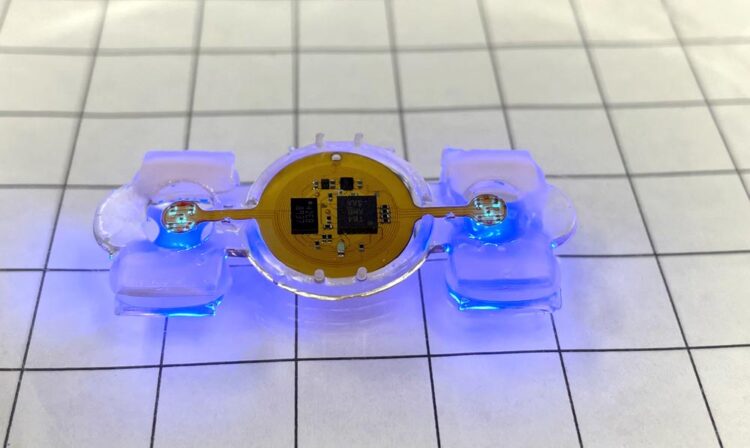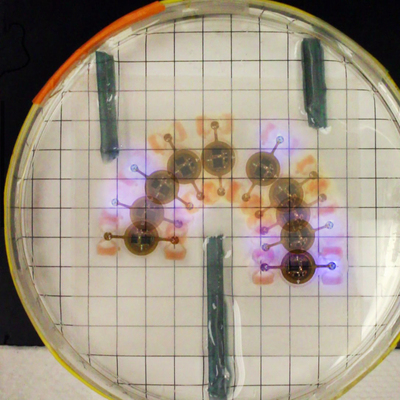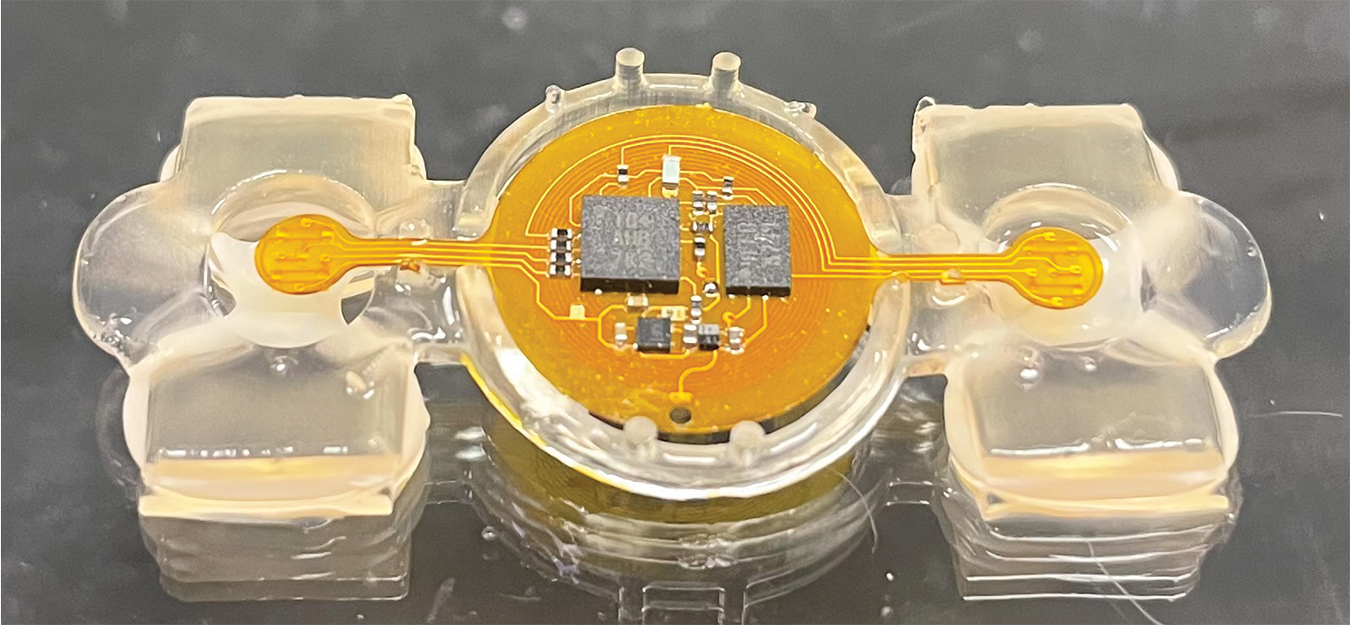Microelectronics give researchers a remote control for biological robots

Remotely controlled miniature biological robots have many potential applications in medicine, sensing and environmental monitoring.
Image courtesy of Yongdeok Kim
First, they walked. Then, they saw the light. Now, miniature biological robots have gained a new trick: remote control.
The hybrid “eBiobots” are the first to combine soft materials, living muscle and microelectronics, said researchers at the University of Illinois Urbana-Champaign, Northwestern University and collaborating institutions. They described their centimeter-scale biological machines in the journal Science Robotics.
“Integrating microelectronics allows the merger of the biological world and the electronics world, both with many advantages of their own, to now produce these electronic biobots and machines that could be useful for many medical, sensing and environmental applications in the future,” said study co-leader Rashid Bashir, an Illinois professor of bioengineering and dean of the Grainger College of Engineering.
Bashir’s group has pioneered the development of biobots, small biological robots powered by mouse muscle tissue grown on a soft 3D-printed polymer skeleton. They demonstrated walking biobots in 2012 and light-activated biobots in 2016. The light activation gave the researchers some control, but practical applications were limited by the question of how to deliver the light pulses to the biobots outside of a lab setting.
The answer to that question came from Northwestern University professor John A. Rogers, a pioneer in flexible bioelectronics, whose team helped integrate tiny wireless microelectronics and battery-free micro-LEDs. This allowed the researchers to remotely control the eBiobots.
“This unusual combination of technology and biology opens up vast opportunities in creating self-healing, learning, evolving, communicating and self-organizing engineered systems. We feel that it’s a very fertile ground for future research with specific potential applications in biomedicine and environmental monitoring,” said Rogers, a professor of materials science and engineering, biomedical engineering and neurological surgery at Northwestern University and director of the Querrey Simpson Institute for Bioelectronics.
To give the biobots the freedom of movement required for practical applications, the researchers set out to eliminate bulky batteries and tethering wires. The eBiobots use a receiver coil to harvest power and provide a regulated output voltage to power the micro-LEDs, said co-first author Zhengwei Li, an assistant professor of biomedical engineering at the University of Houston.
The researchers can send a wireless signal to the eBiobots that prompts the LEDs to pulse. The LEDs stimulate the light-sensitive engineered muscle to contract, moving the polymer legs so that the machines “walk.” The micro-LEDs are so targeted that they can activate specific portions of muscle, making the eBiobot turn in a desired direction. See a video on YouTube.
The researchers used computational modeling to optimize the eBiobot design and component integration for robustness, speed and maneuverability. Illinois professor of mechanical sciences and engineering Mattia Gazzola led the simulation and design of the eBiobots. The iterative design and additive 3D printing of the scaffolds allowed for rapid cycles of experiments and performance improvement, said Gazzola and co-first author Xiaotian Zhang, a postdoctoral researcher in Gazzola’s lab.
The design allows for possible future integration of additional microelectronics, such as chemical and biological sensors, or 3D-printed scaffold parts for functions like pushing or transporting things that the biobots encounter, said co-first author Youngdeok Kim, who completed the work as a graduate student at Illinois.
The integration of electronic sensors or biological neurons would allow the eBiobots to sense and respond to toxins in the environment, biomarkers for disease and more possibilities, the researchers said.
“In developing a first-ever hybrid bioelectronic robot, we are opening the door for a new paradigm of applications for health care innovation, such as in-situ biopsies and analysis, minimum invasive surgery or even cancer detection within the human body,” Li said.
The National Science Foundation and the National Institutes of Health supported this work.
Editor’s notes: To reach Rashid Bashir, email rbashir@illinois.edu. To reach Mattia Gazzola, email mgazzola@illinois.edu. To reach Youngdeok Kim, email yk6@illinois.edu. To reach Zhengwei Li, email zli65@central.uh.edu. To reach John A. Rogers, email jrogers@northwestern.edu.
The paper “Remote control of muscle-driven miniature robots with battery-free wireless optoelectronics” is available online.
Media Contact
All latest news from the category: Life Sciences and Chemistry
Articles and reports from the Life Sciences and chemistry area deal with applied and basic research into modern biology, chemistry and human medicine.
Valuable information can be found on a range of life sciences fields including bacteriology, biochemistry, bionics, bioinformatics, biophysics, biotechnology, genetics, geobotany, human biology, marine biology, microbiology, molecular biology, cellular biology, zoology, bioinorganic chemistry, microchemistry and environmental chemistry.
Newest articles
Faster, more energy-efficient way to manufacture an industrially important chemical
Zirconium combined with silicon nitride enhances the conversion of propane — present in natural gas — needed to create in-demand plastic, polypropylene. Polypropylene is a common type of plastic found…

Energy planning in Ghana as a role model for the world
Improving the resilience of energy systems in the Global South. What criteria should we use to better plan for resilient energy systems? How do socio-economic, technical and climate change related…

Artificial blood vessels could improve heart bypass outcomes
Artificial blood vessels could improve heart bypass outcomes. 3D-printed blood vessels, which closely mimic the properties of human veins, could transform the treatment of cardiovascular diseases. Strong, flexible, gel-like tubes…























